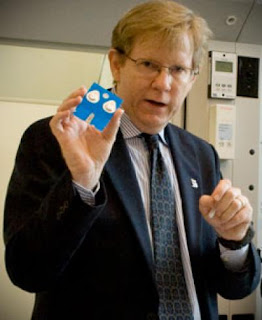Grand Opportunity grant funds rapid saliva test using lab-on-a-chip
HOUSTON -- The National Institutes of Health (NIH) has awarded researchers in Rice University's new BioScience Research Collaborative (BRC) a $2 million Grand Opportunity (GO) grant to develop a fast, inexpensive test for oral cancer that a dentist could perform simply by using a brush to collect a small sample of cells from a patient's mouth.
"We want to provide an accurate diagnosis for oral cancer in less than 30 minutes using a minimally invasive test that requires no scalpels or off-site lab tests," said principal investigator John McDevitt, Rice's Brown-Wiess Professor in Bioengineering and Chemistry. "The payoff for this could be tremendous because oral cancers today are typically diagnosed much too late in their development."
The microchips are mounted on disposable, plastic cards that are slotted into a battery-powered analyzer. A brush-biopsy sample is placed on the card and microfluidic circuits wash cells from the sample into a reaction chamber. The cells pass through mini-fluidic channels about the size of small veins and come in contact with "biomarkers" that react only with specific types of diseased cells. The machine uses two LEDs, or light-emitting diodes, to light up various regions of the cells and cell compartments. Healthy and diseased cells can be distinguished from one another by the way they glow in response to the LEDs.
The oral-cancer test will be developed in collaboration with scientists at the University of Texas M.D. Anderson Cancer Center, the University of Texas Health Science Center at Houston, the University of Texas Health Science Center at San Antonio and the University of Sheffield in the United Kingdom. In addition to cancer, McDevitt's lab is developing tests for heart attacks and HIV, and it is developing a process to produce the disposable cards for pennies apiece.
"An affordable oral-cancer test that can be performed painlessly and quickly in either a regular visit at the doctor or dentist's office benefits patients and clinicians by detecting cancer earlier and lowering health care costs," McDevitt said.
The analyzers used in the test are made by Austin-based startup LabNow, a company McDevitt launched while at the University of Texas at Austin. McDevitt moved his lab from UT-Austin to Rice in July 2009 to be in the BRC, a state-of-the-art research facility that's within walking distance of the major research institutions of the Texas Medical Center (TMC). McDevitt's lab is slated to begin trials of a lab-on-a-chip saliva test for heart attacks with the TMC's Baylor College of Medicine in January. In addition, LabNow is preparing for tests next spring in Africa of a lab-on-a-chip test for HIV immune function. ###
Contact: Jade Boyd jadeboyd@rice.edu 713-348-6778 Rice University















No comments:
Post a Comment